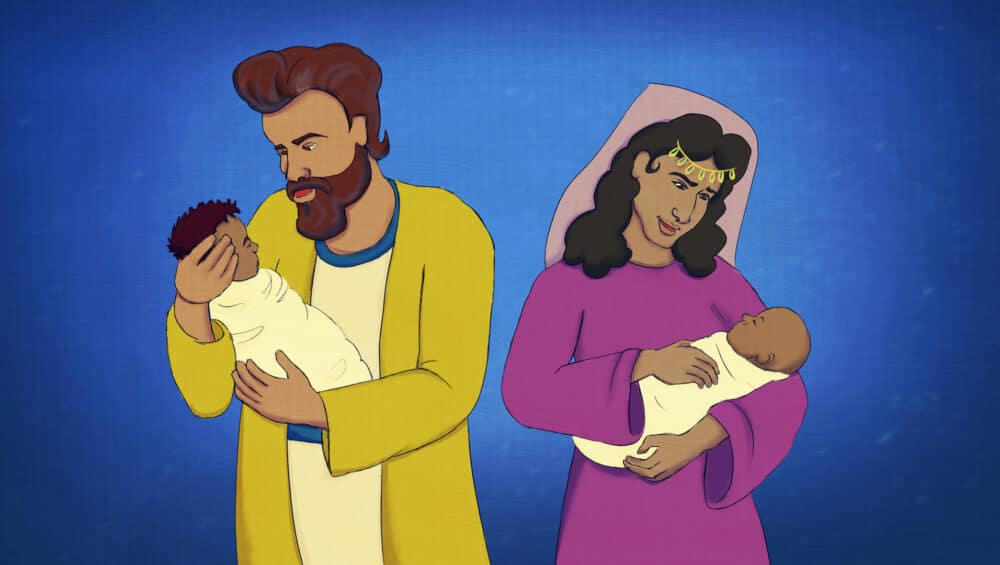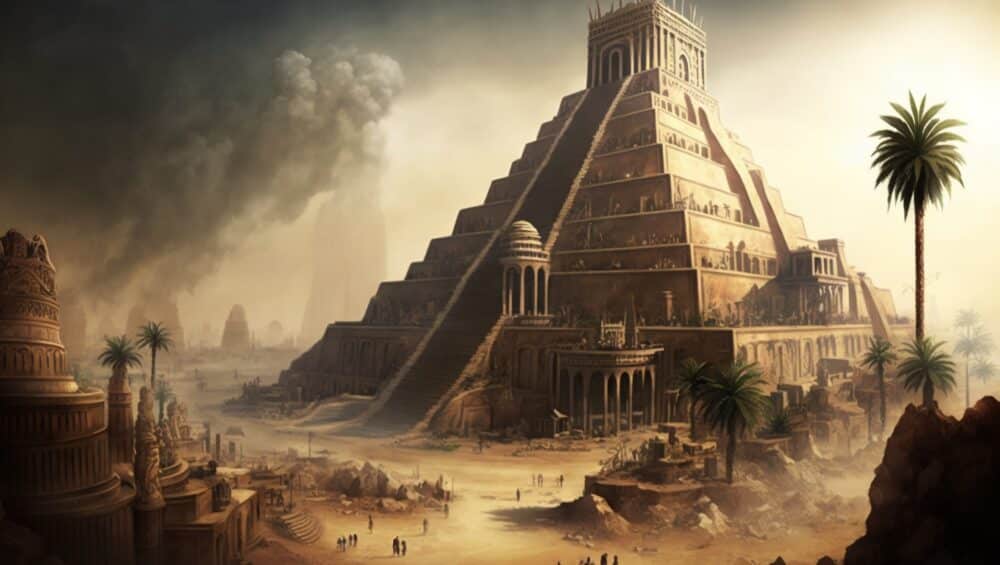Welcome to Livin’ Light’s Bible-In-A-Year challenge of discovering God’s love for us and His purpose for our lives. Here is the format for this great adventure: The daily reading assignment is posted at 5 a.m. After each day’s reading, Leigh An Coplin, the blog host, shares observations and poses questions about difficult passages to Rob Fields, who studied Christian Education at Asbury Seminary and currently teaches Biology in the Orlando area. To start from the beginning, click on 365 Bible Readings and scroll down to Day 1. The reading schedule is taken from The One Year Chronological Bible NLT.
Today’s Reading
— Genesis 11:1-26
— 1 Chronicles 1:24-27
— Genesis 11:27-14:24
(Before 2100 -2084 BC) Click here for a timeline of the whole Bible.
Questions & Observations
Q. (11:9): So this was the start of nations spread far apart? This is a science question, but I have to ask, weren’t people in other parts of the world before the tower of Babel fell?
A. The science as I understand it, tells me that there were humans outside of this region before this story takes place. This is one of the places where, to me, it is dangerous to try to read too much science into the story the author is telling us about the descent of humanity into sin and the tribe of people that God will begin to work with in chapter 12.
There’s a few things that can be helpful to understand here. First, when we use the word “world,” we mean all seven continents and billions of people. But the author of this text would have thought of the whole world as basically the Middle East and North Africa. So put in that perspective, we can see a more appropriate understanding of the distribution of people (if that makes sense).
The other thing to bear in mind is the regression we have made in the first 11 chapters. The whole point of building the tower (according to 11 v.4) is to generate fame and power for the creators. In other words, they are attempting to create a place where the creators are worshipped, rather than God. So if you follow from Adam and Eve on down, we have moved from disobedience to murder to pride in oneself and the things one has made. And while to us pride sounds a lot better than murder, we see in pride the ultimate culmination of sin: we desire to have the throne that rightly belongs only to God: all other sins come from this starting point- when we decide that we should be “running the show” instead of God. This is why the first commandment (Exodus 20) is a warning against worshipping other gods, and the first god that we must remove is the one within each of our hearts.
I honestly could not tell you what the original writer thought he was producing in terms of “how true is this history of the world as I know it?” But what I can tell you is that Tower story represents the depths of humanity’s fall before God acts in the person of Abram to begin to “right the ship.”
Q. (12:1): Any idea on how God talked to Abram?
A. Well, since the Bible (James 2:23 specifically) talks about Abraham as being God’s friend, it is in my mind reasonable to assume that God spoke to Abram/Abraham in conversation as you would speak to any of your friends. God is perfectly capable of speaking to us in any manner He chooses, though in my opinion He most commonly chooses to speak to a person’s mind, conscience, and sense of right and wrong. The text tells us that God appeared to Abraham in various instances (see the dialogue in Gen 18 for example), but does not share exactly how God spoke. I see nothing wrong with assuming that God spoke to Abraham in an audible voice.
Q. (12:12) I am surprised that Abram did not trust God to protect him?
A. Like all of the people God will use throughout the Bible (except Jesus of course), Abram is a deeply flawed person who is capable of sin and deception. This is actually testimony in my mind to the power of God at work. God does not look for perfect people, but instead uses those who will be faithful to what He has called them to do. Just a few examples: Noah (as we read recently) got drunk and wandered around naked, Moses lost his temper repeatedly and was adamant that God didn’t really want him to speak. Aaron, while the first high priest, also created the golden calf while Moses was gone. David got a married woman pregnant and then tried to cover it up before having her husband murdered. Peter denied Jesus, Judas betrayed Him, and all but one of Jesus’ handpicked men fled in terror when He was arrested. I am certain that God is still using flawed people today.
Book suggestion: If this piques your interest, Max Lucado (one of my favorite Christian writers) has a great book on the subject of the imperfect people God has used throughout the ages called Cast of Characters.
O. (13:15): It’s interesting that God “gave” Abram the land of Canaan. Times are so much different now. God is nowhere in land negotiations, unless you ask Him to be.
Q. (13:18): Building altars and sacrifices have come up several times already. What is the meaning of sacrifices to the Lord? The aroma is pleasing to Him? Sacrifices are no longer needed after Jesus died on the cross?
A. Before the formal giving of the Law to the Israelites (found in the next few books), we see several instances of altars and sacrifices, though as you observe, they are often recorded without explanation. I think part of the reason for this was because the first audience for this story (i.e. the original readers/hearers of Genesis) already knew what an altar was and about sacrifices, so the author does not feel compelled to explain.
Basically, at this point, an altar is a collection of stones (sometimes wood is used) assembled and put together as a way of remembering an event, especially as it relates to interactions with God. Abram seems to be using altars as a way of marking important interactions between himself and God.
Regarding the sacrifices, basically what we are taking about is burnt offering (see Leviticus 1 for a description. Warning, this can get graphic if you have a sensitive stomach!). Basically, an animal is killed (usually by slitting the throat) and the blood is drained. The animal is split into pieces and put on a fire to be fully consumed by it. It is the smoke from this ritual that generates the pleasing aroma.
The Old Testament describes a number of types of sacrifices (not all of which involve animals) and the reasons for their use. In the formal sense of the Law, there were three purposes for sacrifice: to honor God (as Noah did), to create a covenant as God does with Abram (coming up in chapter 15 of Genesis), and to make atonement for sin. We’ll talk more about each of those as they come up in subsequent chapters.
O. (14:1-16): This sounds like an extreme Cliffs Notes version of this account. Reading it, I just imagine all the spies that must have been sent ahead to assess their enemies, the attack strategies used, Abram training his army, etc.
O. (14:23): I had to read the account of how Abram rescues Lot a couple times to sift out Abram’s part in it. My understanding is that Abram took no sides in this battle. His mission was to save Lot. I like how he refused to take battle spoils from the King of Sodom because he did not want his fortune tied to a King who reigned over wickedness.
For further study: More insight on the Tower of Babel at https://answersingenesis.org/tower-of-babel/
Shop: The Bible is the only true source for finding truth. You can share this knowledge with others at https://livinlight.org/product/truth/
Tomorrow’s reading: Genesis 15:1-17:27







